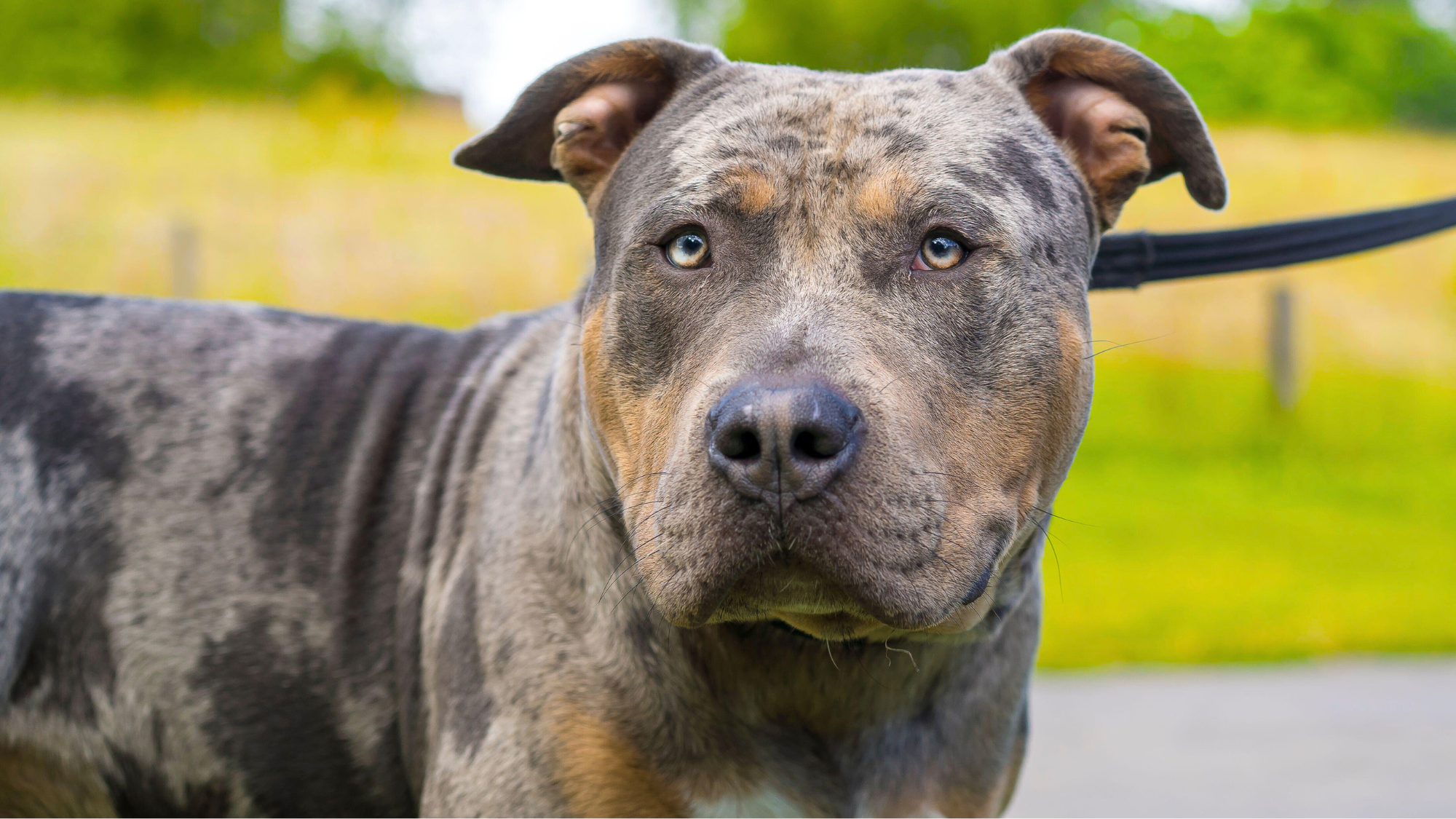| Summary: XL Bullies are not banned federally across America, but several U.S. states and local jurisdictions have imposed restrictions or outright bans. Cities like Denver, Miami, and some parts of Texas enforce breed-specific legislation. Ownership rules vary, so always check local laws before getting or traveling with an XL Bully. |
XL Bullies, also known as the American Bully breed, have become one of the most popular dog breeds in recent years due to their loyal temperament, muscular build, and affectionate nature. However, with the breed’s increasing popularity, the question of whether XL Bullies are banned in America has surfaced more frequently.
I will explore the legal status of XL Bullies in the United States, the role of breed-specific legislation (BSL), and the ongoing debate surrounding dog bans. So, are xl bullies banned in america?
Ensure your Newfoundland’s comfort and security with expert tips on how to ensure a safe collar fit for Newfoundland.
Blog Highlights
ToggleUnderstanding XL Bullies: What Are They?
Before diving into the legal aspects, it’s important to understand what defines an XL Bully. The American Bully is a breed that was developed in the 1990s by crossing the American Pit Bull Terrier with other breeds such as the American Staffordshire Terrier, Bulldogs, and others.

XL Bullies are a specific variant of the American Bully, characterized by their large size, muscular build, and confident, affectionate demeanor.
An XL Bully typically weighs between 70 to 120 pounds, with some individuals reaching even higher weights. Their distinct appearance includes a broad head, thick neck, and a compact, muscular body. Despite their intimidating physical presence, XL Bullies are often described as gentle giants who form strong bonds with their families.
Quick Fix Table:
| State/City | Status | Notes |
| Denver, CO | Banned (repealed in 2021) | Pit bulls allowed with restrictions |
| Miami-Dade, FL | Banned | Includes American Bullies |
| Garland, TX | Restricted | Requires liability insurance |
| Little Rock, AR | Banned | Enforced breed-specific legislation |
| Federal Level | Not Banned | No national law banning XL Bullies |
Are XL Bullies Banned in America?
As of now, XL Bullies are not outright banned across the entire United States. However, there are specific areas and cities where this breed faces restrictions, and certain states have enacted breed-specific legislation (BSL) that targets specific dog breeds, including those that resemble XL Bullies.

Discover the ideal fit by learning what size collar for Newfoundland dog to ensure your pet’s comfort and safety.
In the U.S., the legal landscape regarding XL Bullies varies greatly depending on location. Breed-specific legislation is a controversial approach to regulating dog ownership, where certain breeds are banned or restricted due to perceived aggression or safety concerns.
These laws tend to focus on breeds with certain physical characteristics, such as strength, size, and biting capacity. Unfortunately, XL Bullies often find themselves caught in this category, despite many proponents arguing that a dog’s behavior is more determined by upbringing and training than breed.
Where Are XL Bullies Restricted or Banned?
Here’s a closer look at where XL Bullies may face bans or restrictions in the U.S. It’s important to note that the laws and restrictions may vary at the local or county level within each state.

1. Ohio
Ohio has one of the most well-known breed-specific laws in the U.S., where “pit bulls” are considered a “dangerous breed.” While this law primarily targets pit bull-type dogs, XL Bullies often fall under this category due to their physical similarities to pit bulls. Some local jurisdictions have enacted additional restrictions, such as mandatory insurance for pit bull owners or outright bans on owning these dogs.
2. Florida
Florida has not enacted a state-wide ban on XL Bullies. However, some counties within Florida, such as Miami-Dade County, have breed-specific legislation that bans the ownership of pit bull-type dogs, which may include XL Bullies. The law in Miami-Dade County prohibits the importation, sale, or ownership of pit bulls, including those of the XL Bully variant.
3. Colorado
In Colorado, Denver has implemented breed-specific legislation that bans the ownership of pit bull-type dogs, which includes XL Bullies. Under Denver’s law, residents are prohibited from owning, breeding, or selling pit bull-type dogs within the city limits. Owners who already have pit bull-type dogs may be required to register their pets, but the breed is otherwise restricted.
For expert tips on how to fit a collar on a Belgian Shepherd, this guide offers simple steps to ensure your dog’s collar fits securely and comfortably.
4. Kansas
In Kansas, several cities, including Kansas City, have breed-specific laws that target pit bull-type dogs, and XL Bullies are often included under this classification. Kansas City, in particular, has imposed a ban on owning pit bull breeds, which would extend to XL Bullies as well.
5. Michigan
Michigan does not have a state-wide ban on XL Bullies, but some cities within the state have passed breed-specific legislation. For example, the city of Kalamazoo has restrictions on certain breeds, including pit bull-type dogs, which may affect owners of XL Bullies. Pet owners in such cities may be required to obtain special permits or adhere to stricter regulations.
6. Illinois
While Illinois does not have a statewide ban, cities like Aurora and Springfield have breed-specific laws that restrict the ownership of pit bull-type dogs, including XL Bullies. These cities prohibit the breeding, sale, or ownership of certain breeds, and XL Bullies are often grouped into this category.
7. California
California is one of the more lenient states in terms of breed-specific legislation, but several cities, including San Francisco and Los Angeles, have enacted breed bans targeting pit bull-type dogs. These bans often include XL Bullies, as they share similar physical characteristics with pit bulls. Residents in these cities may need to take extra steps to comply with local regulations regarding dog ownership.
Why Are XL Bullies Targeted by Breed-Specific Legislation?
Breed-specific legislation (BSL) has been a contentious topic for many years. Proponents of BSL argue that certain breeds are more prone to aggression due to their physical characteristics, such as strength, size, and biting potential.

XL Bullies, due to their muscular build and powerful jaws, are often grouped with other breeds like the American Pit Bull Terrier or Rottweilers, which are frequently targeted by BSL.
However, critics of BSL argue that breed alone is not a reliable indicator of a dog’s temperament. Many experts believe that factors such as a dog’s upbringing, training, socialization, and the behavior of its owner are far more important in determining whether a dog will exhibit aggressive tendencies.
Furthermore, opponents of BSL point out that banning specific breeds often fails to address the root causes of dog aggression and can lead to unnecessary euthanasia of innocent dogs.
Breed-Specific Legislation: Pros and Cons
To better understand the ongoing debate surrounding XL Bully bans, let’s take a closer look at the pros and cons of breed-specific legislation.
Pros of Breed-Specific Legislation
- Public Safety: Supporters of BSL argue that banning certain breeds helps protect the public from potentially dangerous dogs, particularly in communities where large, powerful breeds are common.
- Preventing Attacks: Some proponents believe that breed restrictions reduce the likelihood of attacks, especially in areas with a high number of pit bull-type dogs.
- Easier Enforcement: BSL is easier to enforce than behavioral-based laws, as it targets specific breeds and requires less subjective judgment about an individual dog’s behavior.
Cons of Breed-Specific Legislation
- Ineffective in Reducing Attacks: Studies have shown that BSL does not effectively reduce dog attacks or improve public safety. Many incidents of dog bites involve dogs that are not banned by BSL.
- Unfair Punishment: Dogs of banned breeds that are well-behaved often face unnecessary euthanasia or rehoming, while dangerous dogs of other breeds are allowed to remain in the community.
- Discriminatory: Critics argue that BSL unfairly targets certain breeds based on their appearance rather than their behavior, leading to unjust treatment of responsible dog owners and their pets.
For detailed guidance on selecting the correct collar size for a Belgian Shepherd, this article provides essential tips to ensure your dog’s comfort and safety.
XL Bullies and the Future of Breed-Specific Legislation in America
The debate over breed-specific legislation and the banning of XL Bullies is ongoing. While many cities and states continue to implement these laws, there is a growing movement to reconsider and revise them. Advocates for responsible dog ownership and breed-neutral laws argue that addressing a dog’s behavior, rather than its breed, is a more effective way to promote public safety.
Some states have already moved away from breed-specific legislation and instead focus on dangerous dog laws that apply to all breeds. For example, in Ohio, some local jurisdictions have repealed their breed bans and replaced them with laws that regulate dangerous dogs based on behavior rather than breed.
In the future, it’s possible that the trend will continue, and more states and cities will adopt breed-neutral laws that focus on responsible pet ownership and proper dog training. However, for now, XL Bullies remain banned or restricted in certain areas of the United States.
What Can You Do If You Want an XL Bully?
If you live in an area where XL Bullies are banned or restricted, there are a few options to consider:
- Relocate: If owning an XL Bully is important to you, relocating to an area without breed-specific legislation may be an option.
- Adopt from a Rescue: In some areas, adopting an XL Bully from a rescue may be an option, as rescues may have special exemptions from breed bans.
- Advocate for Change: Support efforts to repeal or modify breed-specific legislation in your area. Many organizations are working to change the way laws treat dog breeds and promote breed-neutral policies.
Discover the perfect collar size for an Anatolian Shepherd Dog to ensure comfort and security for your furry friend.
Conclusion: Are XL Bullies Banned in America?

In summary, XL Bullies are not universally banned across America, but they are subject to restrictions in certain cities and states due to breed-specific legislation. While some areas have enacted laws that specifically target pit bull-type dogs, including XL Bullies, other regions are shifting toward more responsible, breed-neutral laws that focus on a dog’s behavior rather than its breed.
As awareness about the limitations of breed-specific laws grows, it’s possible that more regions will move away from breed bans in favor of more effective public safety measures. Learn more about the unique double-layered coat of an Anatolian Shepherd and how to care for it effectively.
For now, prospective XL Bully owners should carefully research the laws in their area and be aware of the potential challenges they may face when it comes to ownership. With proper training, socialization, and responsible ownership, XL Bullies can make wonderful, loving companions for the right owner. Hope so, now you know the answer: Are xl bullies banned in america?





